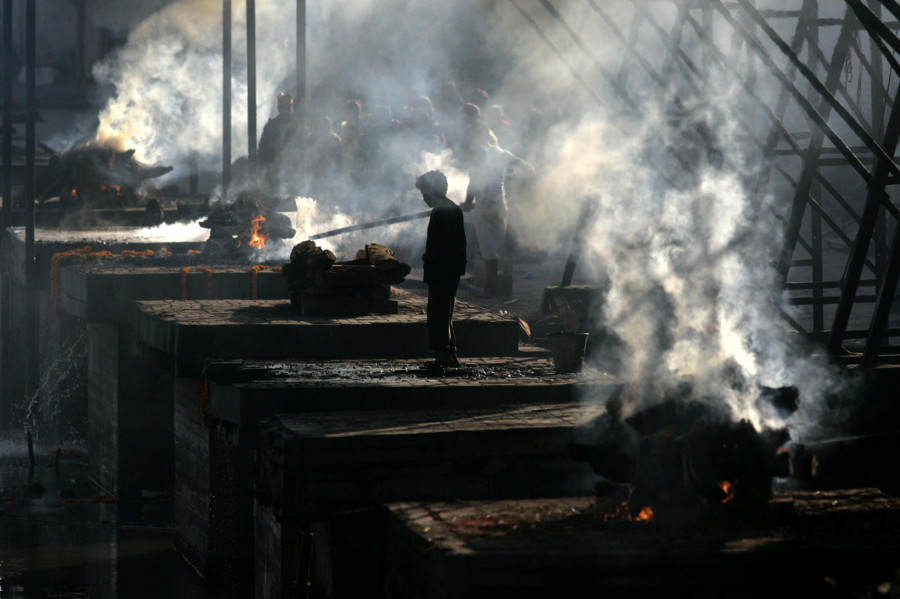Valley
Unhappy with promised perks, pyre burners doubt implementation of the trust’s decision
The indifference of the Pashupati Trust to their demand for better pay and perks led cremators to halt the pyre-burning task.
Anup Ojha
The Pashupati Area Development Trust that oversees the Pashupatinath temple and manages Aryaghat did not respond to the concerns of over three dozen people who are directly involved in cremating bodies for the past three years.
The indifference of the trust to their demand for better pay and perks led the cremators to halt the pyre burning task for three hours on Wednesday morning.
“The Trust showed concern over our demands only after we halted the works at Aryaghat,” said Bidur Budhathoki, coordinator of the Crematorium Management and Service Committee. “The trust fulfilled half of our demands. We did not like to prolong the protest as it concerned death. We didn’t like to do politics over dead bodies; that is why we were compelled to agree with the minimal demands put forth by the trust,” added Budhathoki, who coordinated the protest at Aryaghat.
The committee was formed in 1997 with a view to bringing all those involved in cremation together in an organised manner for their communal cause. Budhathoki said the committee consists of 30 pyre burners and the remaining 10 people who carry wood and do the cleaning in the crematorium area.
In 2015, the committee put forth a nine-point demand and halted the body burning task, but their concerns were not fulfilled.
“It was during the tenure of then-member secretary at the Trust Govinda Tandon that we presented our demands. He had committed, but that didn’t work. Then when Pradeep Dhakal replaced Tandon a year ago, we sent letters many times over and tried to meet him in person. But he continued to show his indifference, and we were compelled to take this action,” said Budhathoki.
The committee sent a letter to the trust in November last year, and again in mid-July this year, but the trust didn't respond to their problems.
"After our tireless effort, the trust was said to address our problem this Sunday but it didn't do anything. That is why we were compelled to take this action," said Budhathoki.
The cremators had placed a banner on Tuesday evening, warning that they would halt the funeral service overall for an indefinite period if their demands were not addressed.
After the protest, Dhakal and other senior officials addressed their demands which included paying Rs500,000 to those who leave the job after serving for two decades in retirement benefit. Earlier they were provided with Rs150,000 each. The trust has also increased the treatment allowance for pyre burners to Rs 15,000 from Rs 5,000, as the task is hazardous. A cremator will now get Rs 300 more—Rs 1,500 in total—for disposing of one body.
When the Post asked Dhakal why the Trust had been indifferent to the problems of Ghat workers, he said, he could not reach a decision alone. “We held a board meeting. Now the trust will be closely coordinating with the pyre burners and their committee,” said Dhakal.
“A majority of them have served for decades at Aryaghat and sustaining their families. We will fulfil our commitments,” said Dhakal.
Cremating bodies is not an easy job. Most of these pyre burners have spent their entire lives burning bodies and playing with fire in extreme heat and smoke in rainy or hot days day and night.
“We had demanded one million. The trust has agreed to provide half of it, and finally, they have made a commitment to paying Rs 200,000 for life insurance from November 17,” said Budhathoki.
Although the trust has been running electric crematorium on its premises since January 2016, the longstanding belief that the departed souls of mortals rest in peace after cremation at Aryaghat has kept the number of people coming to cremate in the traditional way intact.
On average, 15 bodies are burned in a day. The 30 cremators take their turns to perform their duties.
Aryaghat has a dozen traditional pyres—10 for ordinary people and two for VVIPs—to perform the funeral.
“Our work involves a lot of risk. Most of us are uneducated. We have health, psychological and financial problems,” said Chandra Dhakal, 49, a father of two who has been in the job for over three decades.




 14.24°C Kathmandu
14.24°C Kathmandu.jpg)














